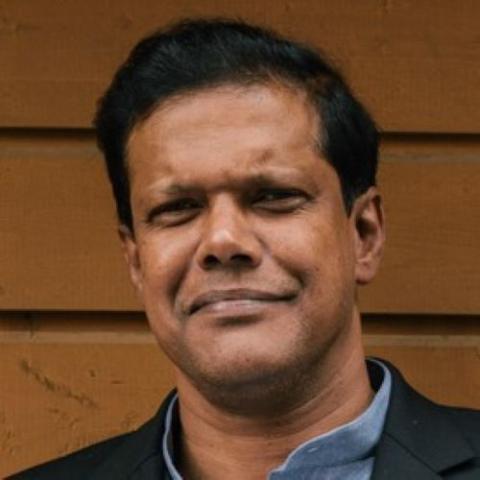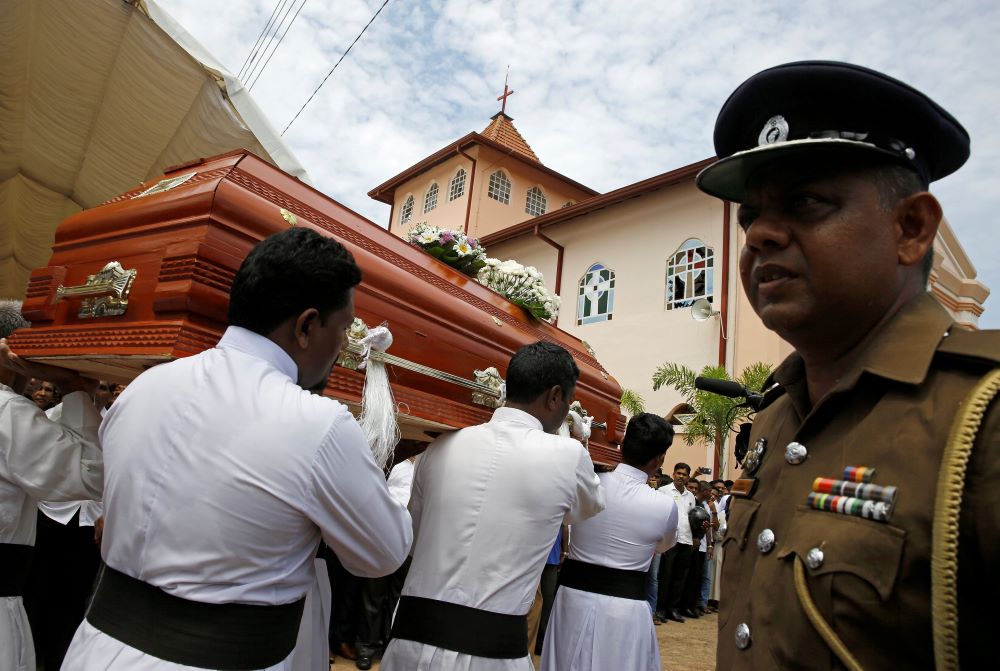
Pallbearers carry a casket into a Catholic church for a funeral Mass for victims in Negombo, Sri Lanka, April 23, 2019, two days after suicide bomb attacks at two Catholic churches left hundreds dead. Catholics' nonviolent response to the Easter 2019 bombings set an example that nonviolence is a viable alternative to violence, Fr. Nandana Manatunga, director of the Human Rights Office of the Diocese of Kandy, Sri Lanka, told NCR. (CNS/Reuters/Thomas Peter)
The first time Sacred Heart Sr. Mary Atimango reached out to a group of gang members who had been carrying out attacks and robberies around Juba, South Sudan's capital, she was overwhelmed with fear.
She wanted to learn why the young men embraced violence and to gauge how open they were to an alternative — an alternative that embraced active nonviolence to confront their frustrations.
"You don't know what will happen," Atimango told NCR in late September, recalling her first outreach in March.
Her concerns soon eased.
"What gave me courage when I reached out, one of the men told me, 'Sister you are so good. No one has reached out to us,' " she said, describing her encounter.
The men told her they turned to criminal activity because they were "idle" and needed a way to support themselves. Robbing others was the way they could do that, she heard.
Since that first meeting Atimango has met occasionally with the men in a safe space: a home near a police station. The group has grown from six to more than 20. At times, one of the men gives her a ride on his motorcycle to the meetings, where she teaches skills in active nonviolence to help them deal with the anger and weariness of not being able to make a living. For the most part, Atimango said, they have given up their weapons and their violent acts in the hope of finding work and gaining social acceptance.
Economic support for the men has been slow to arrive, however. That concerns Atimango.
"There must be some sort of assistance to provide jobs or activities to provide for their livelihood. Without improving their livelihood, there is a possibility they can go back (to their old lives)," she said.
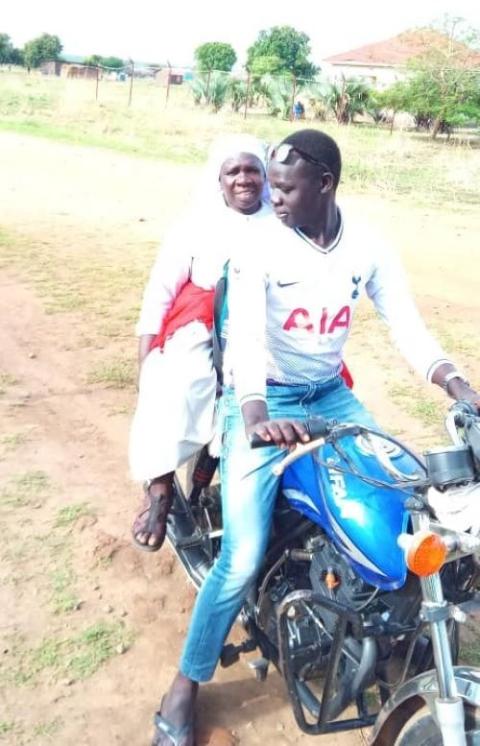
Sacred Heart Sr. Mary Atimango gets a ride on a motorcycle from one of the young men to whom she teaches active nonviolence in Juba, South Sudan, earlier this year. (Courtesy of Mary Atimango)
Atimango, 56, arrived in South Sudan in May 2021 and has been a woman religious for 30 years. She was a witness to violence herself in her native Uganda, where the marauding Lord's Resistance Army pillaged her community when she was a young girl. She understands the impact of violence on people's lives.
Her experience helped in discerning whether to approach the men after learning skills in active nonviolence from representatives of Pax Christi, the international Catholic peace organization, earlier this year. She also teaches those techniques to students in primary and secondary public and private schools.
"From the time I started training them, they have seen a big change in their life," Atimango said of the students. "Fighting and quarreling has stopped. They are able to solve their problems."
Six sisters who live with Atimango in the home they share in Juba call her brave to work with the young men. In her mind though, the outreach is a response to Pope Francis' invitation to go to the margins of society and an opportunity to share the example of the nonviolence lived by Jesus.
Widening call to nonviolence
Prior to talking with NCR, Atimango discussed her experience with the young men Sept. 19 in the third of a series of regional online roundtables hosted by the Catholic Nonviolence Initiative, a project of Brussels-based Pax Christi International.
Marie Dennis, program director of the Catholic Nonviolence Initiative, has organized a series of regional online roundtables focused on the need for broader teaching of Gospel nonviolence. She is pictured after receiving the Pax Christi USA Teacher of Peace Award Aug. 7, 2022, in Arlington, Va. Bishop John E. Stowe of Lexington, Ky., is at right. (CNS/Dennis Sadowski)
Marie Dennis, senior program director for the initiative, said the roundtables were planned to highlight the conversations that have been occurring within the Catholic Church about the need for broader teaching of Gospel nonviolence in schools, parishes and neighborhoods.
Four September roundtables included testimonies from people in the Philippines, Sri Lanka, Congo, Kenya, Honduras and Brazil, as well as those working alongside migrants on the U.S.-Mexico border. The discussions focused on ways participants have taken up nonviolent alternatives in response to the violence in armed conflict, government instability, climate change, poverty and the causes of migration.
Among the responders were church leaders who included Cardinal Oswald Gracias of Mumbai, India; Cardinal Alvaro Ramazzini of Huehuetenango, Guatemala, a member of the Pontifical Commission for Latin America; Bishop Rex Andrew Alarcon of Daet Philippines, who chairs the Philippine bishops' Commission on Youth; and retired s.
As a group, the prelates supported the initiatives being undertaken and suggested that the church begin to integrate active nonviolence into daily life.
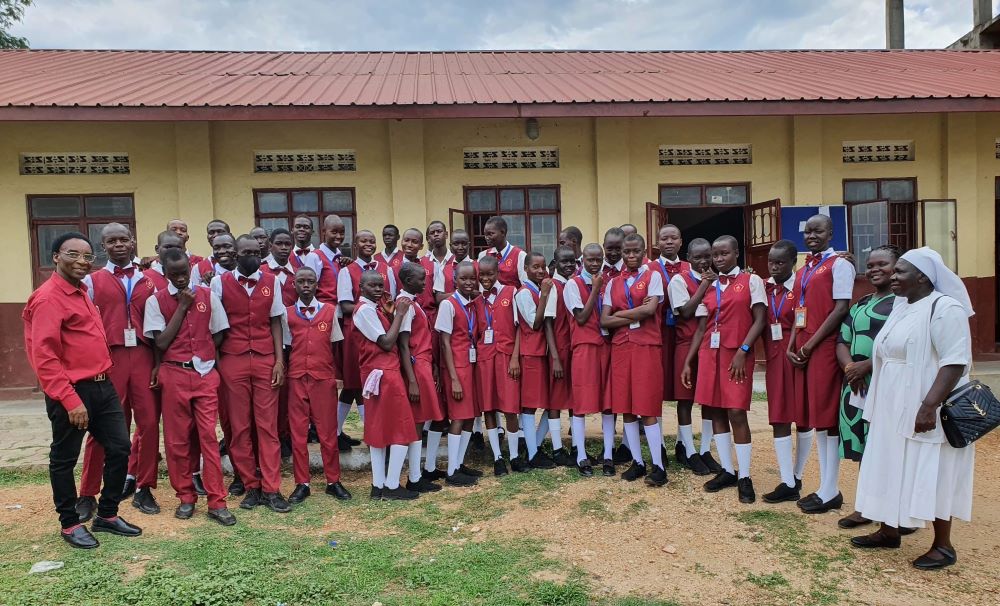
Sacred Heart Sr Mary Atimango, right, stands with students at one of the schools in Juba, South Sudan, where she teaches active nonviolence skills.(Courtesy of Mary Atimango)
Pax Christi has long maintained that active nonviolence is not a passive pursuit. In her effort to shape the understanding of active nonviolence, Dennis has said the practice is "different from pacifism" and requires a concerted commitment to achieving justice while building right relationships.
Supporters of the effort know the work of integrating active nonviolence into daily life and international affairs will not come overnight, but they are hoping people begin to see the practice as morally imperative in a conflict-filled world.
The series was timed as a lead-in to the first session of the Synod of Bishops on synodality, convening at the Vatican Oct. 4-29.
"What can be more synodal than listening to people working at the grassroots level using nonviolence in many different kinds of circumstances effectively and inviting the church to respond?" Dennis asked.
At the urging of Pax Christi International, the Vatican has hosted gatherings since 2017 to discuss the church recommitting to Gospel nonviolence. They have included people working in a variety of settings worldwide who have used active nonviolence to resolve differences and build understanding and respect among parties in conflict.
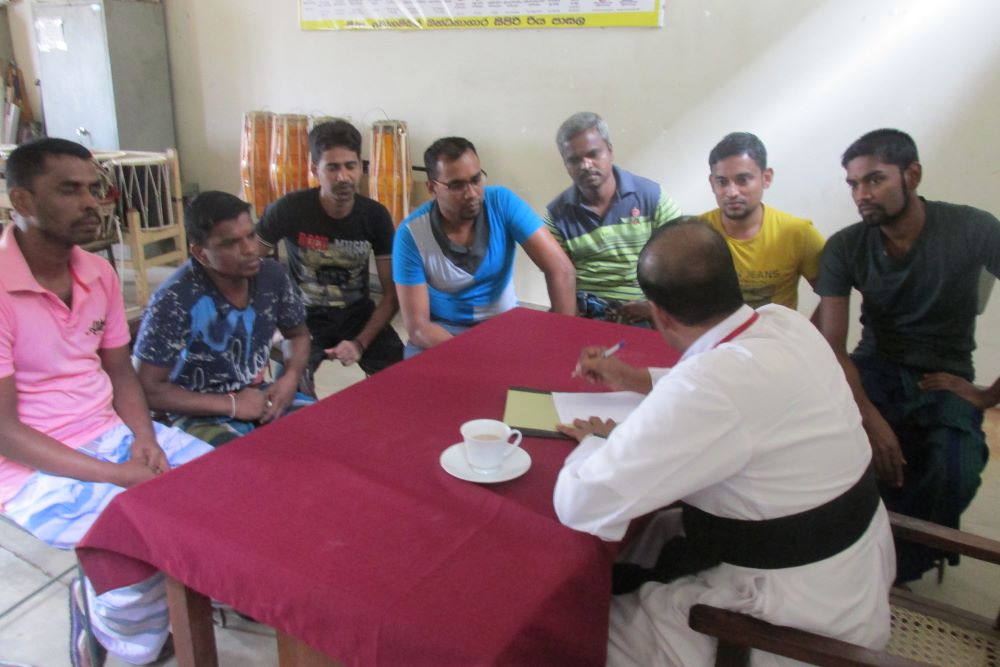
Fr. Nandana Manatunga (behind table) meets with men detained in a Sri Lankan prison.Manatunga is a parish priest and the director of the Human Rights Office of the Diocese of Kandy, Sri Lanka. (Courtesy of Nandana Manatunga)
In recent years, Francis has decried violence in its many forms while inviting the church and the world to embrace nonviolence. He has encouraged people to step to the margins of society to meet, serve and better understand others.
His message has been highlighted in encyclicals on the environment and human fellowship, statements rebuking the possession of nuclear weapons, and his 2017 World Day of Peace address in which he urged humanity to "make active nonviolence our way of life."
Nonviolence in practice
The practice of nonviolence has been the centerpiece of the work of Fr. Nandana Manatunga, a parish priest and the director of the Human Rights Office of the Diocese of Kandy, Sri Lanka.
Manatunga and partners in the Buddhist, Hindu, Muslim and other Christian communities have found it particularly important to unite on behalf of families in efforts to speak out and press officials over the ongoing disappearance, detention and, at times, torture of individuals swept up in Sri Lankan police raids.
Catholics make up 6 percent of Sri Lanka's population, so partnering with other faith communities is a necessity, Manatunga, who in 2018 received the Gwangju Prize for Human Rights, told the roundtable.
The award is presented annually by the May 18 Memorial Foundation in South Korea to recognize "individuals, groups or institutions in Korea and abroad that have contributed in promoting and advancing human rights, democracy and peace through their work." The foundation is named for the May 1980 uprising by tens of thousands of South Koreans who protested a military coup and eventually led to a series of democratic reforms.
After the roundtable, Manatunga explained to NCR that nonviolent action is a requirement of his work and has led to just outcomes for of those whose rights have been violated.
"These victims who come to us, most are Buddhist or Hindu. We have been able to show them the love of Christ ... at all times," said Manatunga, who visits a local prison twice a week to minister to those being held to offer counseling and an art program.
'What can be more synodal than listening to people working at the grassroots level using nonviolence in many different kinds of circumstances effectively and inviting the church to respond?'
—Marie Dennis
He also pointed to Catholics' nonviolent response to two church bombings on Easter 2019 that left hundreds dead and injured as an example for the rest of the country off the southern tip of India that there can be a viable alternative to violence.
"This was very much appreciated. It was very much a scene and people really wanted nonviolent action. The church in 2019 showed the country we can protest nonviolently," the priest said.
While dozens have been charged in connection with the bombings, authorities have shared little information in four-plus years. Manatunga said the church will continue its call for justice.
Rethinking theology
Leo Guardado, assistant professor of theology at Fordham University, joined the roundtable focusing on migration. He echoed participant descriptions of migration as an act of nonviolence against poverty and other threats to human life and dignity.
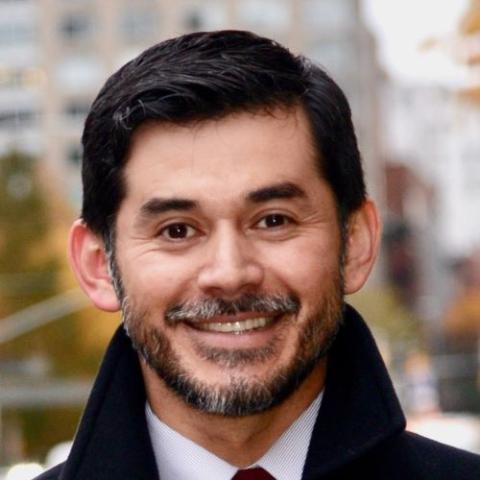
Leo Guardado, assistant professor of theology, Fordham University, joined the roundtable focusing on migration. (Courtesy of Leo Guardado)
He also described his at times the harrowing monthlong trek northward with his mother and others from his native Chalatenango, El Salvador, to the United States as a 9-year-old in 1991 during the country's civil war.
Guided by a woman paid to lead the way — Guardado called her a "coyota" — the Salvadorans stayed in homes along the way, a kind of "smuggling network" built through long-held relationships.
"This is how migrants still get to this country," Guardado told NCR after the last roundtable. "It's what facilitates this travel through countries and landscapes that are radically foreign and dangerous."
Such support, he explained, is based on interdependence and rooted in the desire to help people in need.
"And on the journey," Guardado continued, "that's when you find there's no way that a 9-year-old boy makes it if it's not by the sheer grace, generosity and mercy of those that are journeying with you."
Advertisement
Guardado suggested that a network could be built among U.S. dioceses and parishes, so that people arriving at the southern border can be quickly connected to a support system as they await government action on their immigration status.
"There's deep restructuring of the ways that we think about church that have to happen, that how we think about faith and politics," he said. "These are traditional topics of a Latin American flavor of theology. We just haven't gone through it, I don't think, in the U.S.
"We have not had a Medellin moment, in my opinion, in the U.S. church," he said in reference to the outcome of the 1968 conference in Medellin, Colombia, that shifted the Latin American church's emphasis to poor people. "We have not wrestled ourselves with the shriek of the millions in poverty."
He said the U.S. church is being called to a vocation of mission rather than simply seeing church as a building with a membership community.
"Until we ... understand that deep in the marrow of our bones, then we're to be waiting for NGOs (nongovernmental organizations) or someone else to do the work of imagining new possibilities for being a people across borders. ... So while we've got to work within the nation-state boundaries, that does not mean that we as church also become bounded by those borders. That's where I think our imaging has to break free of that."

